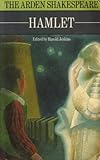Rating: 




 “Hamlet” (York Notes Advanced)
“Hamlet” (York Notes Advanced)
“Whether Hamlet is ever mad, or considered mad, is argued over by critics long and hard. No two performances will convey the same impression of the state of Hamlet’s mind after his interview with the Ghost” (York notes,p86). Every critic, of course, has a different opinion. The majority appear to concur he went mad, with most favouring the position he intended to feign madness in order to exact revenge for his father’s death, perhaps without foresight as to the precise means, but rapidly succumbed to genuine madness as events unfolded. It is unclear what level of insight he had at each stage of the tragic process.
Did Shakespeare intend us to conclude madness became the inevitable result of a pretence on a susceptible disposition? It was always to be a lethal game, as inevitably a mad Hamlet was at least as dangerous to Claudius as a sane one, and Shakespeare indubitably endowed upon Hamlet an intense emotional sensibility and keen sense of justice.
“Attempting a mere trifling with personal identity, assuming a little of a character other than one’s own, within the bounds of normality, if this has its risks, how much more hazardous must be any sustained effort to counterfeit madness?” (Sir James Crichton-Browne). The clue surely is ‘I am mad north north-west..’ (Act 2, Scene 2, Line 367). He must imply a measure of control, madness in a single direction, or way only. Is this valid only at this point of the play?
As for Hamlets decision to feign madness, there can be little doubt. The skill displayed by Shakespeare may be illustrated in the scene with Ophelia where Hamlet clearly overdid it, this is considered very true to life for those given to malingering (a term still used for those feigning mental illness), as they tend to imitate the extreme. Later, in the scene with his mother Gertrude, we are led to believe he is genuinely mad, or is it that she is going along with the ruse?
If we remain personally convinced Hamlet feigns madness throughout the play however, we come up against a grave difficulty. If he is not responsible for his actions by reason of insanity, how can we possibly reconcile how a man of his moral sensibility should restrain himself from killing Claudius at the first opportunity only because he was at prayer, and Hamlet reasoned he would therefore go straight to heaven? Or that Hamlet should seemingly have no remorse for the deaths of Polonius, Rosencrantz and Guildenstern, his unkindness to Ophelia and his behaviour after her death? On this theory, he is not merely feigning madness, but a logical, cold blooded response to events he clearly loses control over.
Ophelia herself, impressionable, without familial support, dependent upon a Hamlet now apparently mad, succumbed to that form of mental illness recognizable today in so many youth suicides. Shakespeare does not moralise, or even interpret (he leaves that to his audience), but what he is doing is using Ophelia to both contrast and clarify Hamlet’s madness. Whether we feel her madness follows shock and bereavement, what we might today describe as Post Traumatic Shock Syndrome, in any case has a ring of truth about it, Hamlet, being well capable of satire, contempt and irony in turn, whilst mad, puts that element of doubt in our minds. Deliberately, it seems.
“Madness may be defined as being in a minority of one. Hamlet is not afraid of this position.” He himself expresses confidence ‘in the one judicious person who may overweigh a whole theatre of others’ (Act 3, Sn 2). We are that judicious person. The discrepancy between his words and his behaviour becomes increasingly apparent. Since Hamlet, the fine intellect, castigates himself a number of times of failing to live up to what is expected of him, Prince of Denmark, son of a wronged father, could it be, in the final analysis, that he took the easy option?
On the reality or otherwise, of Ghosts
A final note on Shakespeare’s use of the Ghost. Experiencing the supernatural has long been associated with madness. Observe also, how Shakespeare makes use of a very prevalent scripturally based Elizabethan belief (2 Corinthians 11:14 and others) :
“The spirit that I have seen
May be the devil: and the devil hath power
To assume a pleasing shape; yea, and perhaps
Out of my weakness and my melancholy,
As he is very potent with such spirits,
Abuses me to damn me.”
This remarkable passage (Act 2, Sn 2) Hamlet (New Warwick Shakespeare) , harmonises with this explanation in Sir Thomas Browne’s Religio Medici (1643): “ I believe that these apparitions and ghosts of departed persons are not the souls of men, but the unquiet walks of devils, prompting and suggesting unto us murder, blood and villainy, instilling and stealing into our hearts, that the blessed spirits are not at rest in their graves, but wander solicitous of the affairs of the world”.
In like fashion, the Commentary on the Old Testament, by C. F. Keil and F. Delitzsch, in a footnote on 1 Samuel 28: 11, 12 : “Luther says . . . ‘The raising of Samuel by a soothsayer or witch, in, was certainly merely a spectre of the devil; not only because the Scriptures state that it was effected by a woman who was full of Devils (for who could believe that the souls of believers, who are in the hand of God, . . . were under the power of the Devil, and of simple men?), but also because it was evidently in opposition to the command of God that Saul and the woman inquired of the dead. The Holy Ghost cannot do anything against this himself, nor can He help those who act in opposition to it.’ Calvin also regards the apparition as only a spectre . . . : ‘It is certain,’ he says, ‘that it was not really Samuel, for God would never have allowed His prophets to be subjected to such diabolical conjuring. For here is a sorceress calling up the dead from the grave. Does anyone imagine that God wished His prophet to be exposed to such ignominy; as if the devil had power over the bodies and souls of the saints which are in His keeping? The souls of the saints are said to rest . . . in God, waiting for their happy resurrection. Besides, are we to believe that Samuel took his cloak with him into the grave? For all these reasons, it appears evident that the apparition was nothing more than a spectre, and that the senses of the woman herself were so deceived, that she thought she saw Samuel, whereas it really was not he.’ The earlier orthodox theologians also disputed the reality of the appearance of the departed Samuel on just the same grounds.”